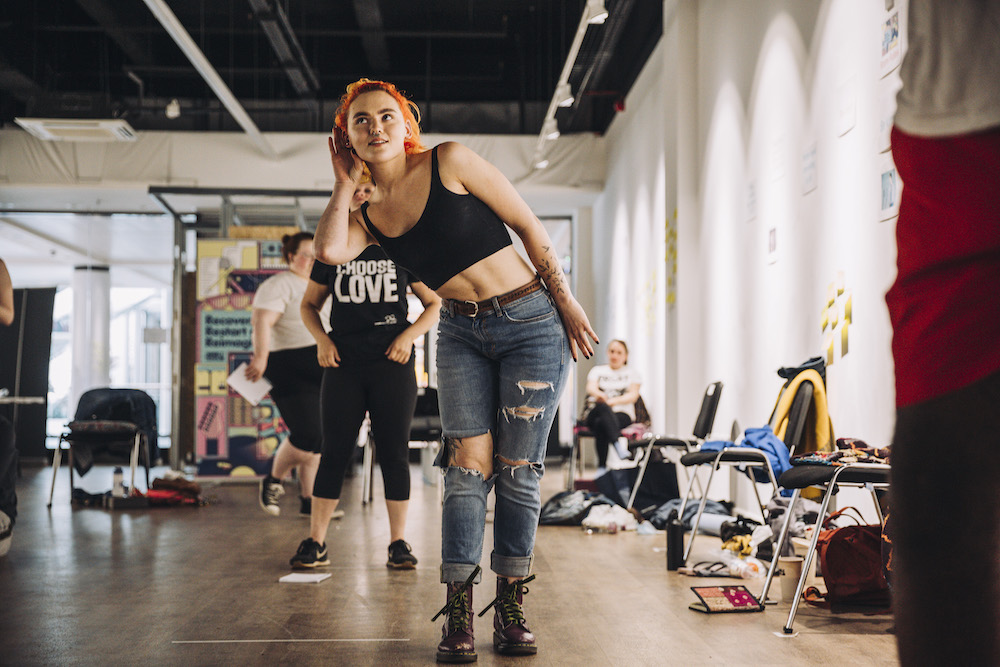
- Join the Middle Child artist development mailing list to be the first to hear about future opportunities.

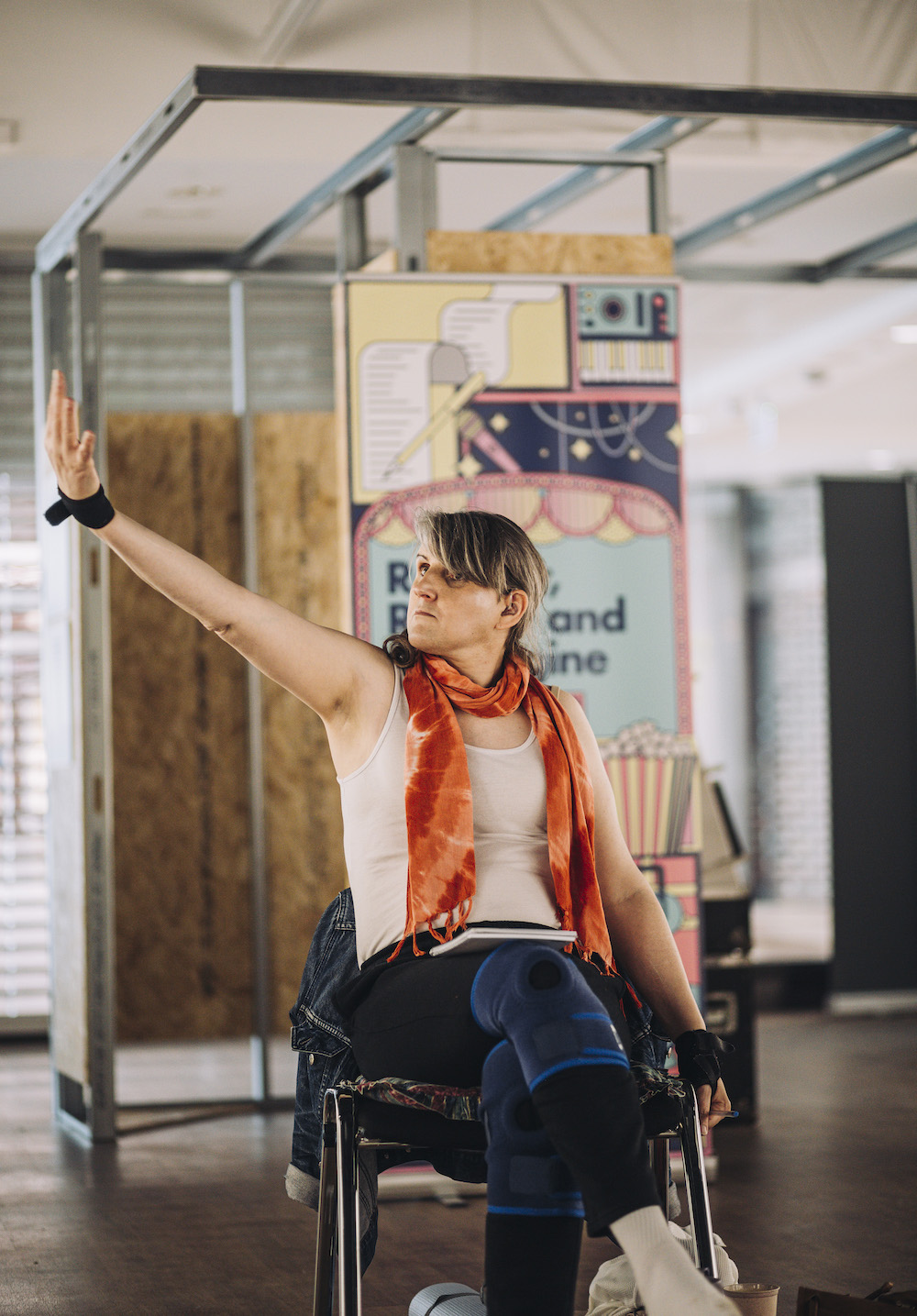
Michelle Dee, writer and performer, is one of our participants for the Recover, Restart and Reimagine programme and she has taken some time to reflect on thoughts after the group’s first week, with a focus on recovering.
When you’ve spent the last 16 months on and off with your doorstep as your full stop, the invitation of structure is either just what you need or maybe tempting fate. The line ‘invitation of structure’ came from one of the other participants in the programme but it resonated with me, it landed in my lap like a warning.
During the three lockdowns, I quickly fell into a routine of getting up each day, eating breakfast switching on or avoiding the news depending on my mood. I moved around my flat like a robot from one space to the other, finding different ways to pass the time. I found I couldn’t bring myself to focus on reading an entire book, so read bits of poetry, articles online, the minute details of how to shield that fell through my letterbox on a regular basis.
The Recover, Restart and Reimagine programme demanded the attendance of each candidate 9am to 6pm, four days a week. That has come as quite a challenge but so far so good. I have got through the first week and not been late.
As a freelancer in the before times I didn’t have regular hours, that’s not to say I didn’t work hard, but it would be at irregular hours, forever changing and some weeks would be intense, whereas others would stretch out: empty as my bank balance.
We artists have to be able to adapt to different situations, some projects demand more from us than others, sometimes this is dependent on whatever fee we have managed to negotiate. With the Recover, Restart and Reimagine project the fee is set, the rules have been negotiated by each one of us, we all understand. I wasn’t prepared for how it would feel to be in a space, day on day with the same group, each one passionate about their work, each wondering how they can ever get back to how they expressed themselves creatively before. It has felt quite overwhelming at times and emotional. I have come to recognise how much I need this is in my life, the chance to connect with new and familiar faces, talking, laughing the ebb and flow of conversation, without a screen between us.
Another idea introduced by a participant on Recover, Restart and Reimagine programme was the idea of a Stress Bucket. They described how we all have a stress bucket and how it might contain a manageable level of stress-inducing things. With the lockdowns and Covid paralysing many of our lives, the levels of stress have increased. They talked about each of us having a background stress level before Covid, and how new stresses wouldn’t necessarily tip the balance. With Covid and all the different ways that has impacted and changed our every day the background stress levels have increased significantly so that a seemingly insignificant incident or issue can now fill the stress bucket so it overflows much more than it ever would before.
Recover, Restart and Reimagine has been designed not to add to that stress bucket but to try to understand and find new ways to counter the stress feelings, to lower the background stress levels to a manageable level. It does this in a number of ways, one of which is the introduction of Yoga sessions every morning. I have found I have had to adapt some of the moves to meet my own abilities, while some are in downward dog others are in tabletop or when warrior pose is called for I’m managing waving at seagulls.
The necessity of taking time out to breathe has never been more important or rewarding. I have been reminded once again that I have spent the last forty years breathing incorrectly, instead of filling the belly with air when breathing in, I have always pulled the stomach in creating a hollow, then releasing the breath. After these sessions, there is a wonderful sense of calm in the room, that before I might have disregarded as new age nonsense, but now I think there might just be something in it after all.

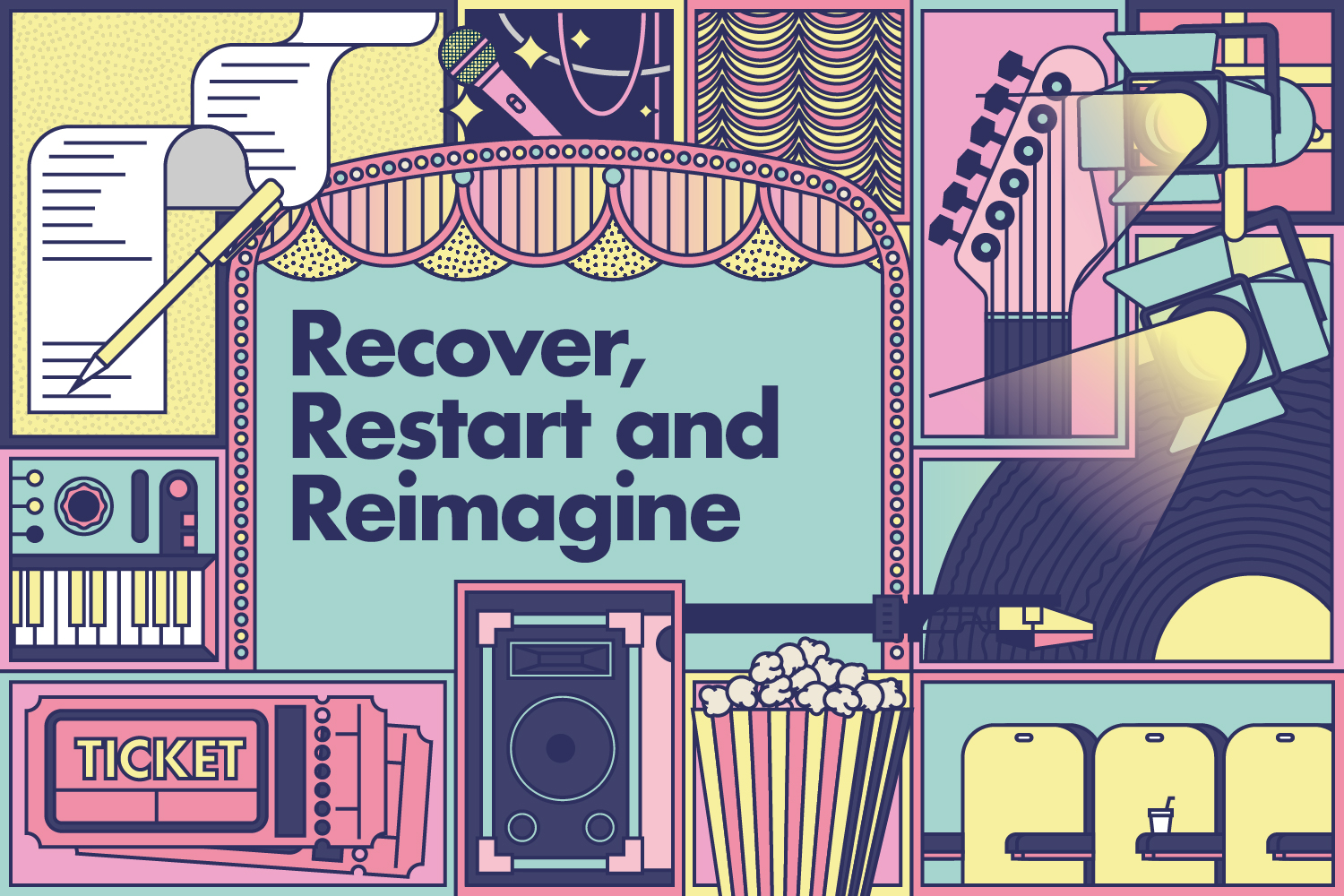
Today sees the start of our gently radical Recover, Restart and Reimagine programme, in which 13 Hull theatre workers will be paid to come together to think, breathe and play.
Those involved will be able to participate in organised activities and self-led time to inspire, stretch and develop creative muscles after a year of lockdown and theatre closures.
Recover, Restart and Reimagine combines masterclasses and workshops with skill-sharing and self-development and time to play, with sessions by Tabby Lamb, Nastazja Domaradzka, Tobi Kyeremateng, Mick Ord, Sagar Shah, Jon Beney and many more.
The first week will focus on recovery, wellbeing and reflection. Week two is dedicated to restarting, with opportunities to refresh skills, plan and try new things and week three is all about reimagining, with time to dream about what the future should look like – and put actions in place to make that future happen.
The programme will also form a crucial theatre worker support network in Hull as we ease out of lockdown.
The 13 participants, who were chosen by a selection panel of freelancers after applying last month, include two parents who are sharing a place around childcare.
Follow Middle Child on Twitter and Instagram for updates throughout the programme.
Recover, Restart and Reimagine is made possible by the Cultural Recovery Fund and Smile Foundation I Am Fund. Thanks also go to Princes Quay for providing us with a space for three weeks.
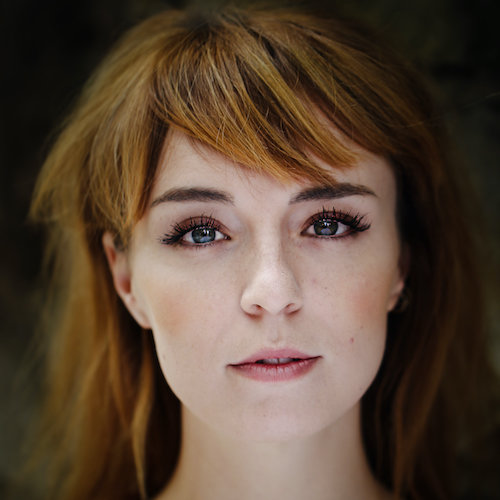
Actor and theatre maker
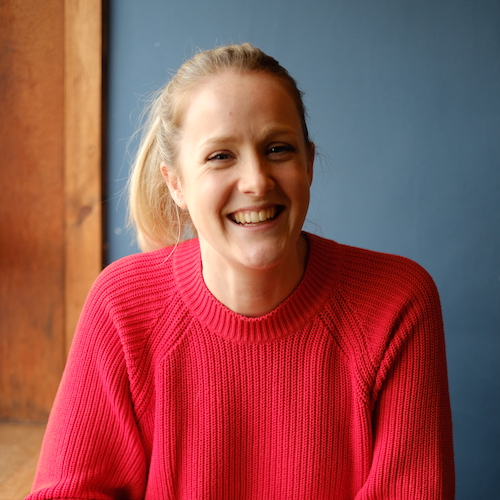
Writer
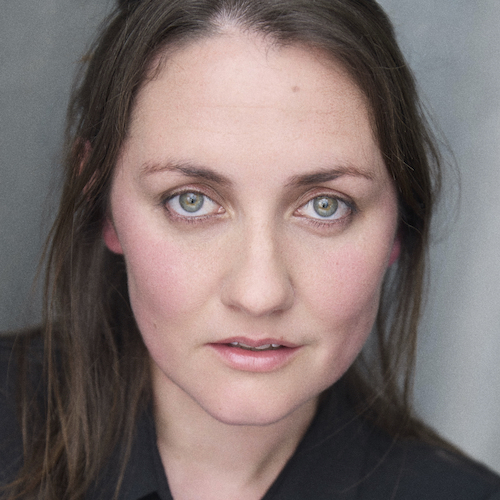
Actor and theatre maker
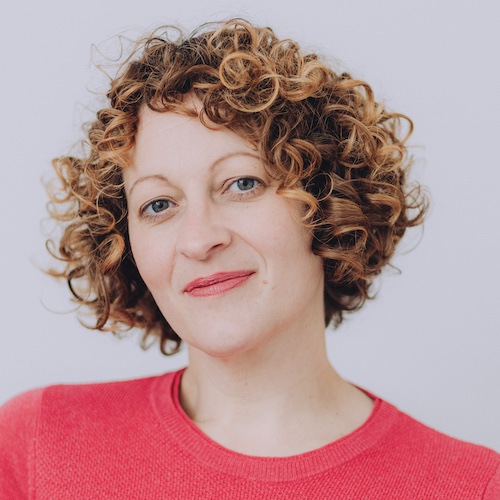
Actor and writer/comedian
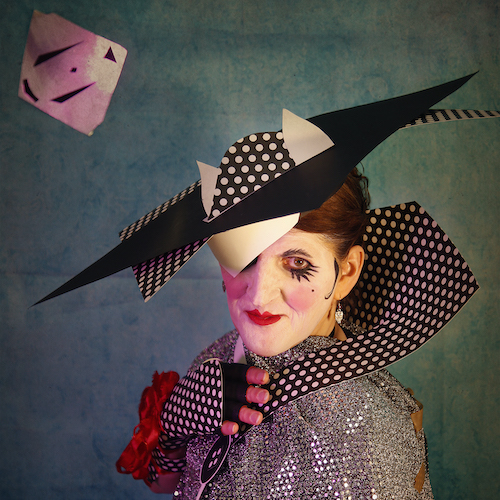
Writer and performer
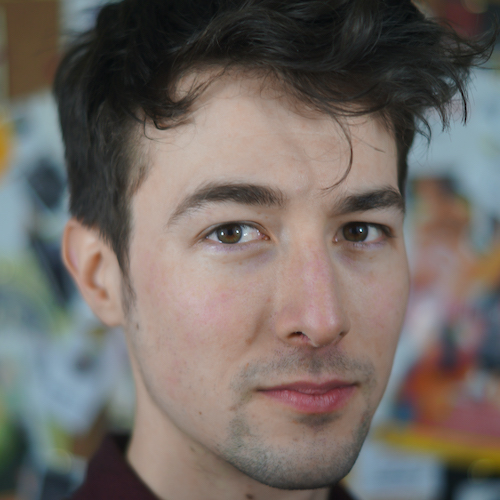
Lighting and video designer
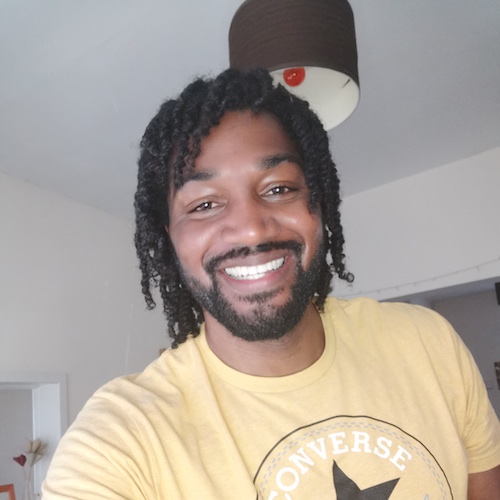
Writer, theatre maker and artist
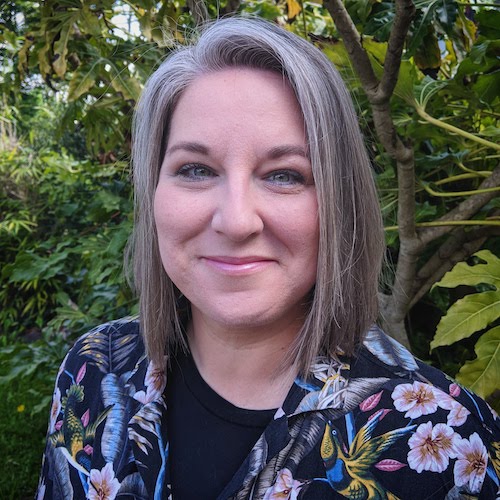
Writer and performer
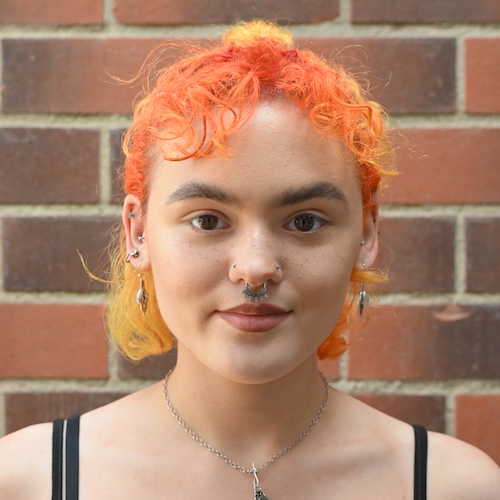
Actor and theatre maker

Theatre maker
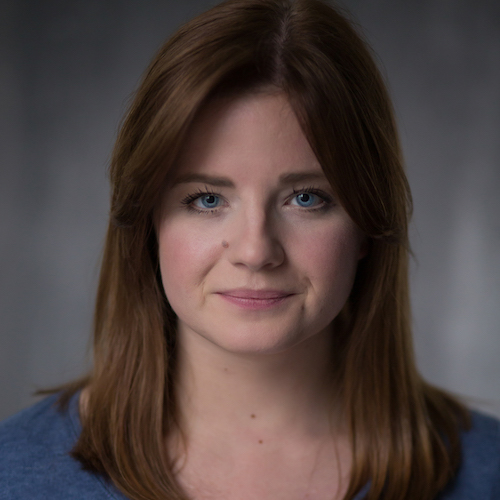
Actor, theatre maker and facilitator
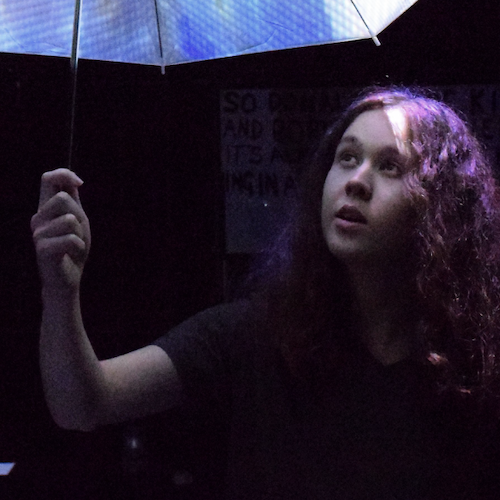
Theatre maker and poet
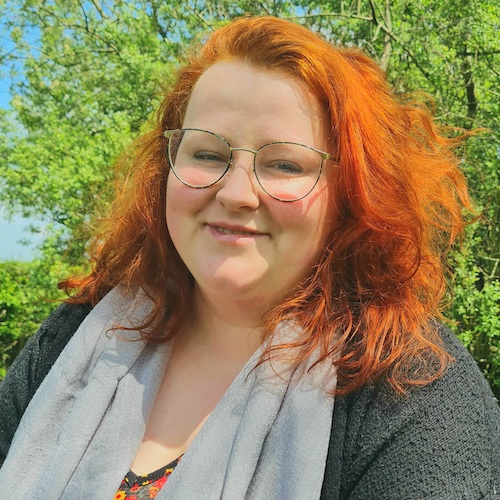
Theatre maker


Artwork by Joseph Cox
By Paul Smith, artistic director
This time last year I wrote about how Middle Child were going quiet for a bit so that we could make more noise in future. A lot has happened since then, with more uncertainty crammed into a 12 month period than I can remember at any other point in my 34 years. During that period Middle Child, like all of us in the arts, have had to try new things, find new ways of working and try to keep hold of our purpose as the world twists and turns. It has been, without doubt, the hardest period in our company’s 10 year history as we – a company who exist to bring people together, celebrate liveness and fight for the underdog – lost projects, lost our home and, truthfully, lost everything we knew how to do. Speaking personally, the year has taken its toll, leading to a crisis of confidence, of purpose and of “is theatre really the best way we can put something good into the world?”
But with this introspection and amidst all of this uncertainty comes a unique kind of clarity. A clarity around values. Around why we do what we do. Around the decisions we need to make. And it is these core values that have guided the way for Middle Child throughout this entire pandemic and which have led us to each and every decision we have made along the way. They were central to our decision to start a fundraiser for freelancers who had lost income, our choice to introduce flexible working to our organisation and our decision to continue employing freelancers and investing in people throughout the pandemic.
They are also the cause of areas of hesitancy, caution and nervousness. They tangle us up in knots as we try to navigate complex issues and they dominate our conscience as we try to grow as a company in a way that feels “us”. Our values are what we return to when balancing creative ambition, financial sustainability, politics, morality, health and safety, work-life balance and straight-up uncomplicated ego. They are there when we consider whether to apply for the Cultural Recovery Fund, whether to put the panto online, whether to take over this new building or that one. When all else is dark it is these values that light the way and lead us onwards. And so, in deciding what to do next and how we ‘re-emerge’ from the pandemic we must do so guided by our values.
As a company whose guiding vision is for a fair and equitable world, where anyone’s story can be told and heard, it is clear that we simply cannot stand by and risk losing a generation of theatre workers either as a result of a pandemic or because of an industry that continues to be built to work only for a select few. And so we got to work.
On 11 March this year we hosted a day online, which we called Imagine the Future, that brought together a group of brilliant freelancers from theatre and further afield to help us consider four questions:
It was an incredible day, full of brilliant ideas, generosity and a conviction that things can be better. We listened, learnt and were left with an overwhelming number of great ideas for what the future could look like. We felt the weight of those conversations, and also of those that weren’t had, of those who weren’t there. We felt energised by the potential of our action and tired by the thought of its scale. We were inspired by possibility and overwhelmed by choice. We looked at the list of suggestions with optimism and then at our budget with pragmatism. A few things became clear:
And so, what we are announcing today isn’t the “Middle Child 20 Year Action Plan for a Better World”, it’s simply our next “something”. It’s a something based on the listening, learning and reflecting we’ve been doing over the past year, and we truly believe it will make a genuine difference and is gently radical in its own way. And then one day soon we’ll announce another something, and another something and another something.
From both our Imagine the Future day and some of the wider reading we’ve been doing, such as from Freelancers Make Theatre Work, it’s clear that there are calls for deeper, more meaningful engagement with freelancers, a call for more equity and power to be distributed to freelancers, and a call for an investment in people, rather than projects. Our Recover, Restart and Reimagine programme is built on these three pillars and designed in response to an acknowledgment that the past 12 months have led to a loss of confidence, income and opportunity for freelancers across the sector.
Everyone at Middle Child is determined to contribute to a sustainable reimagining of our industry following the impact of the pandemic, and our first offer to this end is a partly-curated, partly-self-led programme, which will last for three weeks, paying 12 Hull freelancers £1,500 each to come together to rebuild confidence, develop skills and take stock.
The programme, which runs four days per week, 9am – 6pm, from 15 June to 2 July, represents a space to think, breathe and play without the pressure of coming up with an output. It is designed to inspire, stretch and develop participants in a safe space, which acknowledges what we’ve been through and the impact on our work and our practices. Everyone involved will be paid for their time and also benefit from a wide range of free workshops, masterclasses and training alongside group time, individual time and free time. To partially quote one of our Imagine the Future post-it notes, it’ll be a bit like Byker Grove meets a Rocky montage, but with a spa soundtrack.
The first week will be dedicated to recovery with a focus on wellbeing, self-care and reflection. Week two will focus on restarting with time to refresh skills, make plans and try something new. Week three will be all about reimagining, with time spent envisioning the future, dreaming about what it should look like and putting actions in place to make it happen. Alongside all of this run a number of recurring events, from group play readings and coffee mornings to skill sharings and open discussions. We’ll create our own haven fuelled by respect, curiosity and care.
Our ambition is for these three weeks to be transformative for all who take part with participants leaving feeling ready for the battles ahead but not burnt out by deadlines or pressures of output.
We would love to hear from people who live and work in Hull and who contribute to making theatre in any way, be it through acting, directing, designing, stage managing, producing, composing or any other role you might find in a show programme. We want applications from those we know and those we don’t, from people at the very beginning of their career to those who’ve been around a while. We welcome and encourage applications from everyone regardless of their age, race, religion or belief, sexual orientation, gender identity, ethnicity, disability or nationality.
We are a PiPA (Parents and Carers in Performing Arts) partner and are always happy to discuss solutions that allow people to balance caring responsibilities with working lives, for example through sharing a place on the programme or a flexible attendance arrangement.
You can apply because you know exactly what you want from life, or because you have no idea. We’re as interested in chaos and confusion as we are in clarity and certainty. Our application process is simple and straightforward, and all we ask for is honesty and for you to be yourself. In line with ongoing efforts to decentralise power and decision making in our organisation, choices around selection for this programme will be informed by an advisory panel of freelancers.
This programme is representative of our ongoing desire to offer practical solutions, and take action to return with renewed energy for an improved theatre industry. We believe this radical programme, which invests in people, rather than projects, represents a good first step in doing so locally and is a meaningful investment in the freelancers upon whom our work depends.
We will continue to listen, take stock and lead necessary action across other areas of our company to improve what we do, and how we do it. There is much more happening in the background that we will talk about when we can, but for now we hope this programme is an exciting offer, which is proof that we will turn words into value-led action as we build a better future together.
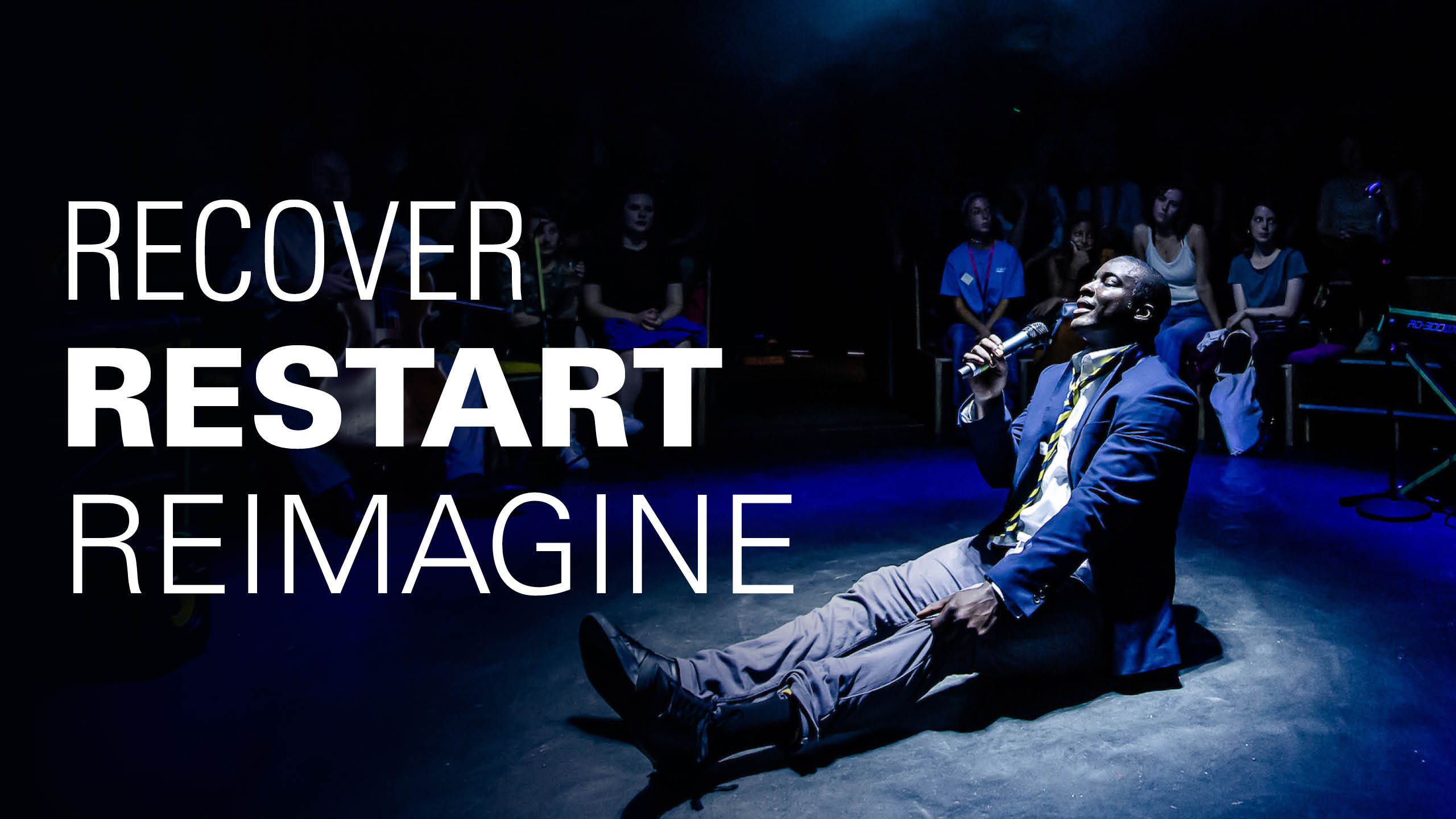

The start of this week saw restrictions on the toughest lockdown yet ease for the first time in months, coinciding with a spell of unseasonal warm weather. For the first time in a long time, it feels like we’re heading towards something that might look like life after the pandemic. Touch wood.
As a theatre company that has been working from home for the past year and exclusively online, we could come out of one of the most challenging years of our lives full tilt. However, from speaking with many of the freelancers who are part of the extended Middle Child family, such as at our recent Imagine the Future discussion, it’s clear that not everybody has the energy just yet.
People have varying degrees of confidence about the months ahead: some people are chomping at the bit, while others may have reservations. Let’s not forget that the pandemic isn’t actually over yet. For others, spending a year or more within the same few walls has worn away at mental health and the ability to be creative. There’s a lot of mental and physical muscle memory to start flexing again and it’s going to take time.
So what are Middle Child going to do about it?
On Tuesday we learned that we’ve received £76,065 from the second round of the Cultural Recovery Fund. It’s a huge sum of money and we take seriously our responsibility to use it to benefit our wider theatre community – both artists and audiences – here in Hull, an already deprived city that has been especially badly hit by the pandemic.
Given all of the above, it’s clear that many theatre makers in Hull need the time, money and resource to Recover, Restart and Reimagine. So that’s what we’re going to do over the coming months, with a bespoke programme of work aimed at supporting our workforce and local freelancers to re-adjust at their own speed, in a way that is safe and sustainable.
That includes putting money into freelancers’ pockets to attend and benefit from workshops, residencies and sharings, as part of our largest ever artist development programme. There is also a programme of work that will see us return to the stage in 2021, which will employ theatre makers as well as once again provide audiences with unforgettable live experiences.
Furthermore we are excited to be able to return to Hull city centre with a new pop-up arts space in the summer, following the closure of our creative hub, Darley’s, last year, while we continue to locate a permanent home in the longer term.
We’re not quite ready to share all the details just yet – we’ll make a proper splash about all of that soon enough. However we are certain that this approach will have a huge impact on the long-term future of Hull, sharing skills and resources to build resilience and confidence in both our workforce and freelancers, acknowledging that we simply cannot be sustainable without you.
It’s an unprecedented situation and we’ll do our best to get this right and respond to any changes around us, putting people’s health and wellbeing first. We are committed to being open about our plans and acknowledging our shortcomings as well as shouting about our successes. Our door is always open and we welcome thoughts on how Recover, Restart and Reimagine, as well as our wider work, can better help people in Hull.
We also remain aware of the challenges our industry continues to face and wish to express solidarity with those organisations who did not receive funding this week. We will do all we can to share resources and support both individuals and organisations in the continued fight for survival. Please don’t hesitate to contact us if you would like to talk further.
The life after the pandemic that we mentioned at the top cannot look like the life many people lived before. We remain a company committed to creating greater equity in who makes and enjoys theatre and will use this investment to continue to work towards a more inclusive and representative industry.
We are also delighted to hear that our local partners Hull Truck Theatre, Hull Jazz Festival, Artlink, the John Godber Company, the Adelphi Club, Wrecking Ball Press, Northern Academy of Performing Arts, ITSL and HPSS were also successful in their applications to the Cultural Recovery Fund.
We look forward to sharing full details of what we have planned in the coming weeks.
With love and solidarity,
Middle Child x
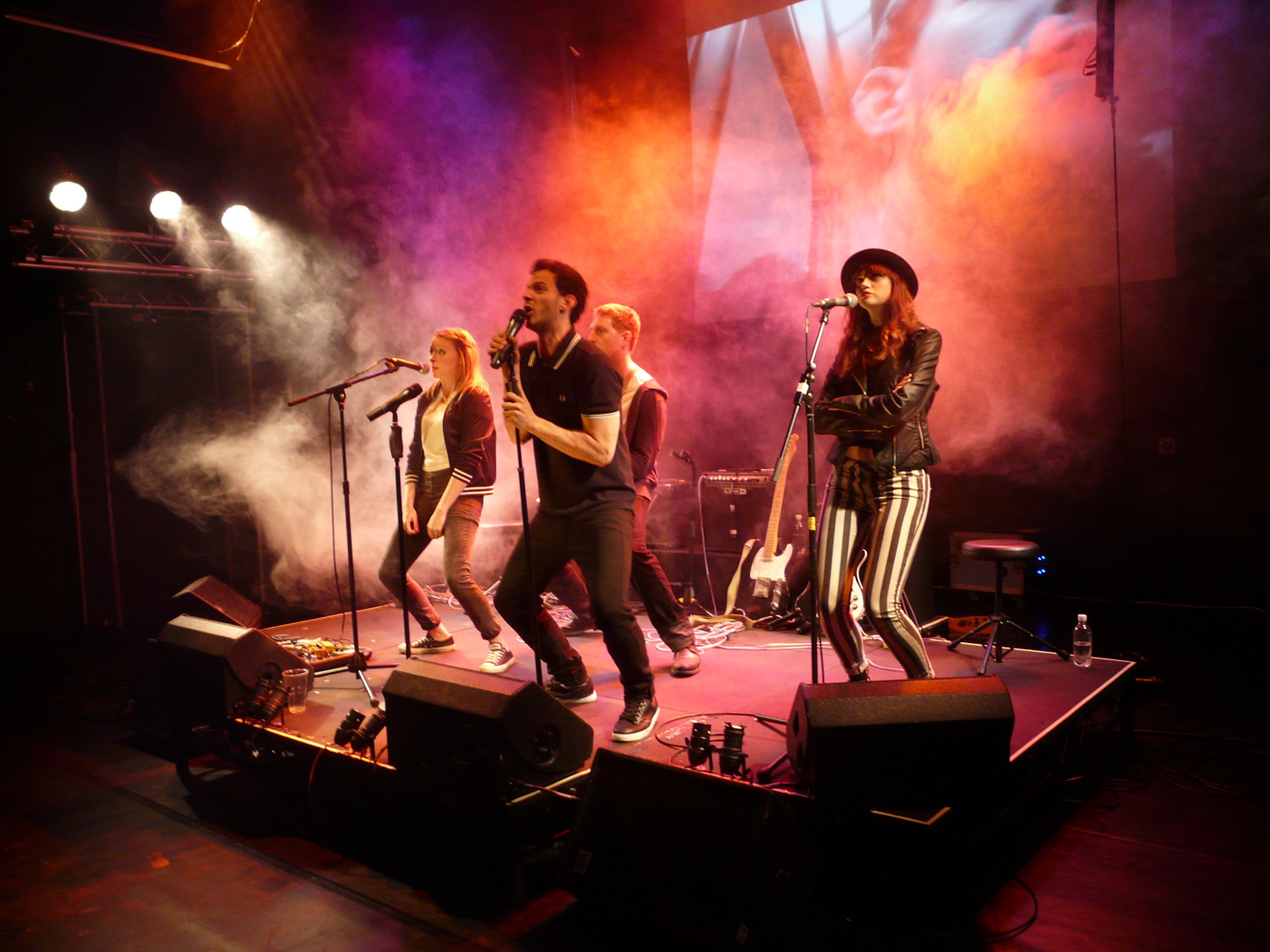
In January the press reported that the Department for Education was considering proposals to cut performing arts BTECs from the curriculum. These qualifications were critical stepping stones into the arts for both our artistic director, Paul Smith, and general and production manager, Emily Anderton. Here, Emily writes about her experience of BTECs and why they are so important to working class theatre makers.
Growing up in Hull, I was one of eight children and lived with my mum and stepdad in a council house. Safe to say I come from a working class background and I didn’t have savings in the bank to go to drama school, not that I was keen on being out of my comfort zone and leaving the city. My journey into the arts, then, was different to many.
I went to a local mainstream school and school was school until year 10, when you chose your options. Not really knowing what to do, but also not really wanting to get bogged down in more desk-based learning, I chose the only other options that were available: GCSE PE, art and drama. I hated exercise and was more interested in the lights in the rig than performing in my drama class, but I looked forward to my art lessons.
My art teacher designed and painted the sets for the school productions under the watchful eye of the drama department. That was something I got involved in quite quickly, painting the sets and stage crewing for the BTEC drama exams and Rock Challenge. It soon became an extracurricular activity, doing it most evenings and weekends.
When my secondary school became Northern Premier winners of Rock Challenge, we raised the money to perform in Australia. Rock was a performing arts competition that started in Sydney in 1980, in which schools and colleges brought an eight minute long devised dance piece to the competition and were eligible for a number of awards. Australia felt like a once in a lifetime opportunity and that’s where my passion for the arts began. Those of you who know me will know that I’m not the type of person to conga around the arena on finals day, but the buzz from the whole experience made me want to forge a career in the arts. Behind the scenes, obviously.
Careers days at school always followed a formula. You would go on an away day to Hull College, where girls would be put in childcare or hairdressing demonstrations and boys in mechanics and engineering. You were programmed into thinking these were the only options available. When it came to enrolling in college, I did what most people did at school and signed up for a childcare course.
But during the holidays, abroad with family and away from my friends, I had a realisation: I didn’t need to follow the crowd, but look for something I actually wanted to do instead. So I went through clearing onto the BTEC Stage Management and Technical Theatre Course at Hull College, a course that wasn’t offered to me at school or even openly advertised.
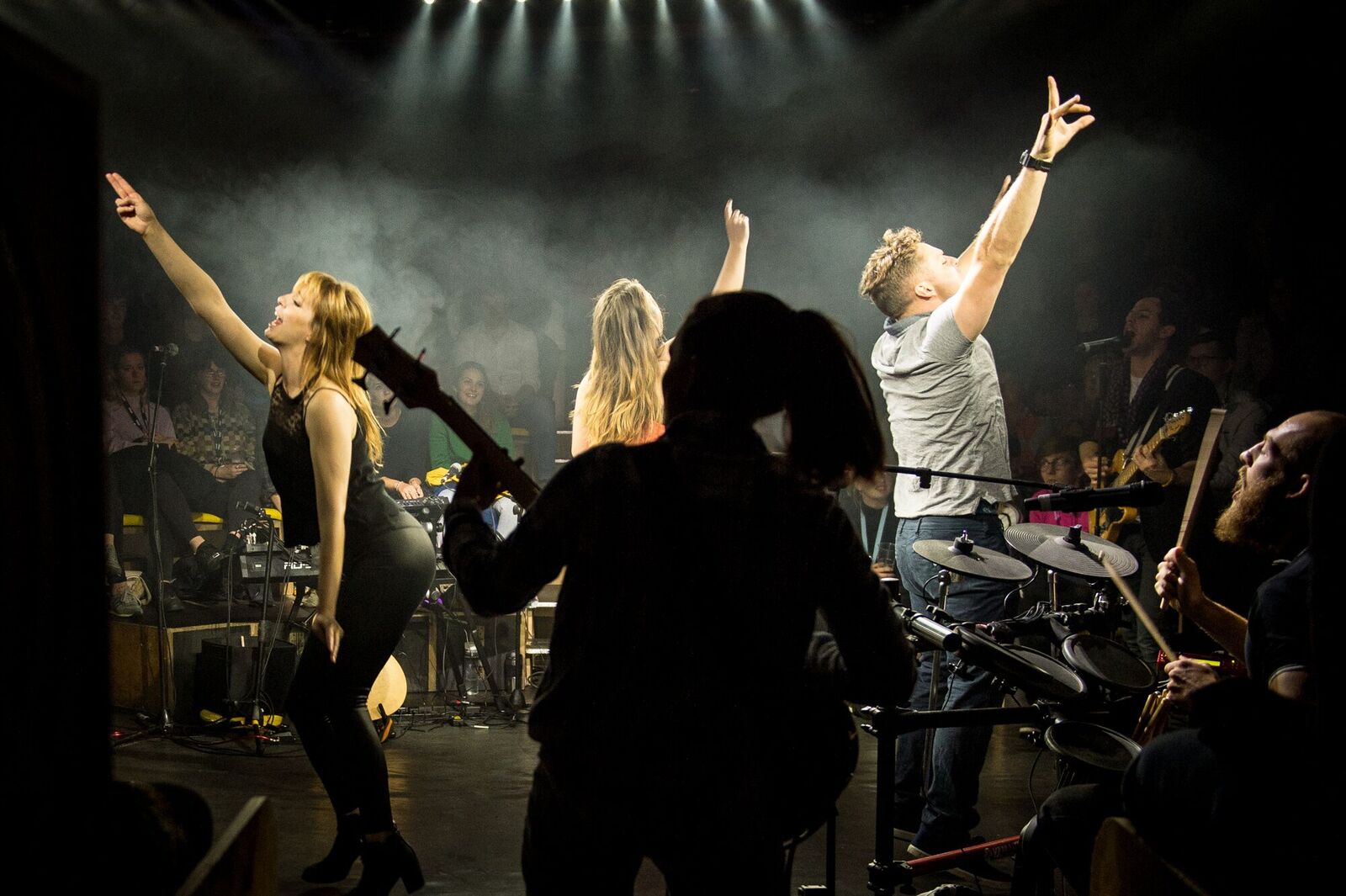
All We Ever Wanted Was Everything in the Paines Plough Roundabout, 2017. Lighting design by Emily Anderton.
I had to fight my way into the theatre industry via the only pathways that were available to me at the time. After the BTEC I continued at Hull College with a BA Hons Degree in Stage Management and Technical Theatre, graduating in 2012.
Whilst studying I worked freelance for various production companies in and around Hull and, in August 2012, I was appointed the role of technician at Hull Truck Theatre. Whilst in post I continued to work freelance as a production assistant and lighting designer.
Whilst working at Hull Truck I had my first child and, due to the demands of the role and parenthood, I decided to move on, as the late nights and weekends didn’t work well with family life. In 2018 I joined Middle Child on their journey of becoming an Arts Council England National Portfolio Organisation and became general and production manager.
Aside from the touring aspects of my career, I managed to graduate and remain in Hull. This is quite unusual in the arts, as people often migrate to London to start their career, because that is where most opportunities are perceived to be.
My question to the Department for Education is, if BTEC courses cease to exist in the arts and you are unable or simply don’t want to take an A Level, where do you begin in the arts industry?
How do you get the credentials to get into university? Consider an academic subject at A level you didn’t want to do at GCSE level, drop out halfway through because it isn’t what you actually want to do now you have a choice and not secure a place at university?
I strongly believe that the uptake on such BTEC courses in the arts isn’t as popular as others due to the lack of knowledge they exist, but none the less they are still a pathway for many.
When secondaries in Hull became academies, subjects such as music, art and drama were among the subjects cut in both time and budget commitments, with schools seeing them as less favourable. In 2018, Ofsted chief Amanda Spielman even said academic subjects were the best route to higher-level study, particularly for working-class children. The result cuts access to the arts at one of its earliest and most accessible sources.
Performing arts isn’t just for the qualification; it is about expression and personality of the individual, whether it be performing, painting or writing, it is so much more than just learning the syllabus and putting pen to paper.

Weekend Rockstars, 2016. Lighting design by Emily Anderton.
Recent media coverage has suggested that the Department for Education is planning to “reform” qualifications for 16–19-year-olds. The alternative options would-be A Levels, T Levels and apprenticeships. Other qualifications at level three and below, such as BTECs, will only be funded if they are “high quality, are necessary, have a clear purpose, and lead to good outcomes”.
A BTEC is an alternative qualification to an A Level, based around practical rather than academic study, with course work taking the place of exams. BTECs can be done alongside other GCSEs and A Levels in school and college. Some schools offer BTECs depending on their values in relation to the subject and capacity, as the courses usually require attending college. Similar to an apprenticeship, a BTEC is a great way to do work-based learning, but a better option for theatre, as there are fewer apprenticeships available in Hull.
On the stage management BTEC I took, modules were studied and then applied in live productions. We learnt all the roles associated with making a production and what they did, we set up production teams, took on those roles, teamed up with other courses and made shows. Everything was learnt by applying the skills practically and being able to make mistakes without being failed by a teacher. The course work was paperwork that needed to be completed as part of the role; for example a deputy stage manager would submit their prompt script.
Working in the arts you are always learning on the job and there is always something around the corner that you haven’t dealt with before, so a BTEC is a good place to start. I imagine that the A Level equivalent would be very history based and not as interesting to the practical mind.
People who work in the arts will know that you don’t need qualifications to be good at what you do, but it certainly helps with your CV, in the early days, whilst you build your portfolio. Some employers are also still setting quite ambitious requirements in their job advertisements, which require higher education.
In the long term we have identified, along with other organisations, the lack of technical and production graduates based in Hull. Most creatives and freelancers are brought from London to work with local companies on a show-by-show basis.
Middle Child offer a programme of freelance training opportunities, taking unnecessary higher education qualifications out of essential job requirements. We have a great artist development programme, and are currently looking into how we can incorporate production and technical opportunities into this.
We are under no illusions that the skills do actually exist in the city, but performing arts graduates tend to move on and people in other fields don’t know their skills are transferable into the arts. Maybe arts employers could help by considering where they advertise and make their job advertisements clear that desired skills could be a conversation point. From personal experience Middle Child know that you don’t have to have five years’ experience to be able to do a good job.
The plan to scrap BTEC courses would mean that arts-based courses, like the one I took, would no longer be available, putting a roadblock in the way for anyone from a less academic or working class background to gain arts qualification for their CV.
What else can Middle Child – and the wider theatre industry – do to protect BTEC qualifications and similar routes into the arts for young working class people?
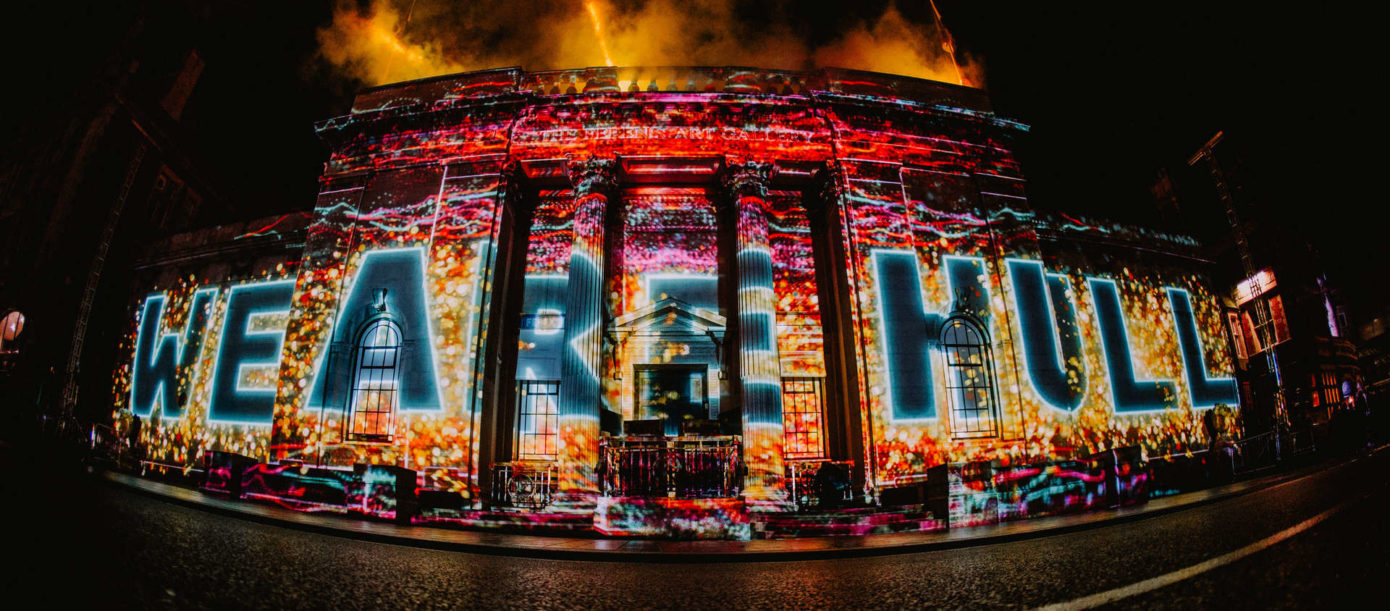
We’re hosting the next City Arts Forum on Thursday 4 February (2-4pm) and would love for artists in Hull to join us, with all of our core team in attendance.
Paul Holloway, arts and culture manager at Hull City Council, will chair the meeting, which is an opportunity for artists, arts organisations, and anyone interested in the arts in Hull, to share work, thoughts, ideas and updates.
It’s also an opportunity to ask any questions you may have, to the council and wider artistic community
Registration is free but you must book in advance via Eventbrite. A link to join the discussion will then be sent out 24 hours before the event.
If you would like to discuss an issue, please send your agenda items to cityartsenquiries@hullcc.gov.uk by Monday 1 February.
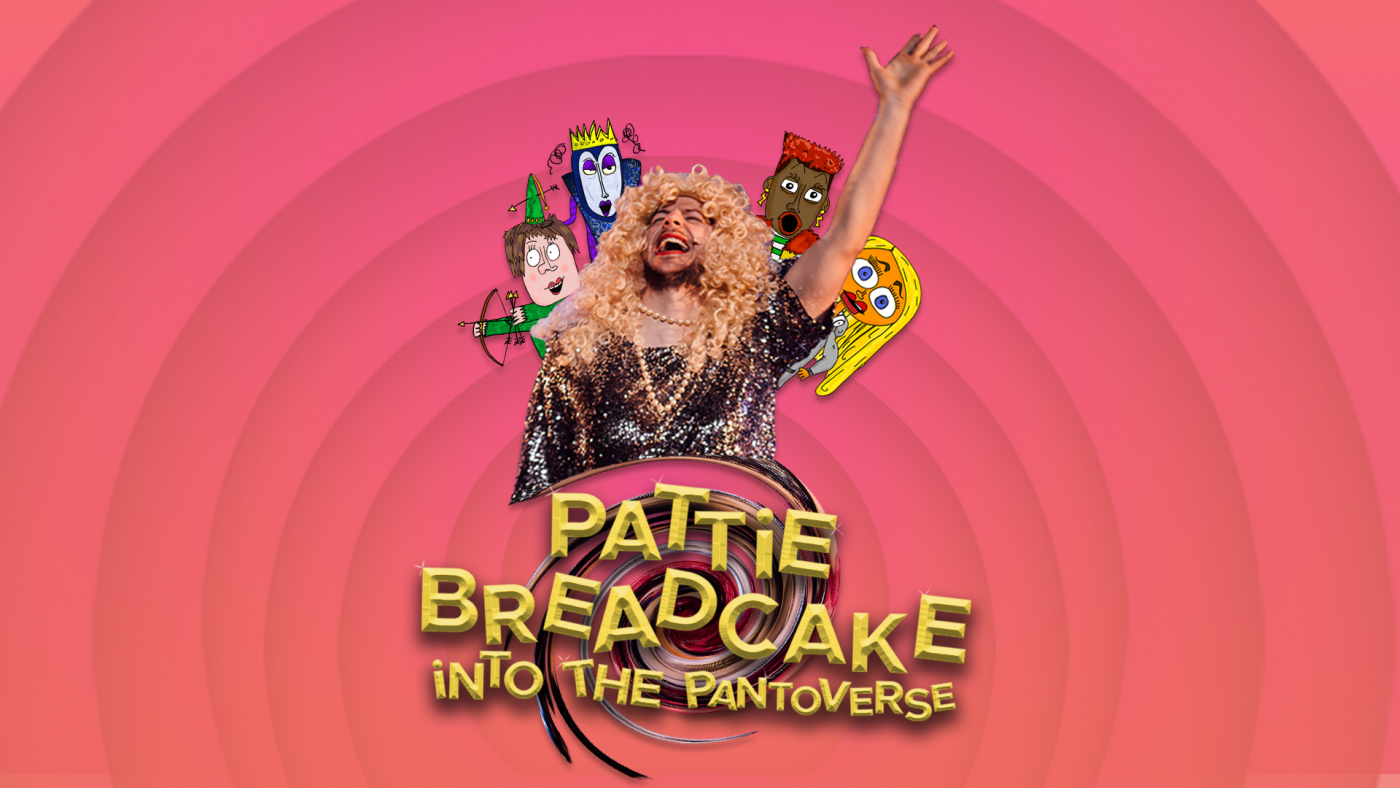

This year’s long-awaited Middle Child Christmas show has finally been revealed – and for the first time ever it will be animated and free to watch from the comfort of your own home.
Pattie Breadcake: Into the Pantoverse sees our favourite dame, Pattie Breadcake, magicked into an animated version of Hull, where she must help four panto princesses retell their stories for a modern audience.
To add to the excitement, a radio version will also be broadcast on BBC Radio Humberside across four mini episodes before Christmas, making it accessible to those without internet access.
With coronavirus restrictions closing theatres in Hull throughout December, this will be the first year Middle Child haven’t performed a panto in-person since we started the tradition at Fruit in 2011, before moving to Jubilee Central in 2018.
We couldn’t not offer families some Christmas cheer this year though, so have teamed up with local animators My Pockets to bring the spirit of panto to life online.
We’ve also assembled a team of four incredible writers to work alongside Middle Child artistic director, Paul Smith, on the scripts that combine to tell the tale of Pattie’s adventure into the Pantoverse.
Deborah Acheampong is one of our nine new associate writers and her version of Cinderella is her first ever commission.
Deborah said: “It’s honestly been amazing working with Middle Child for their Christmas panto, it’s felt like such a whirlwind.
“I didn’t think that, after sending them a script of mine in the summer, I could end up working on something so fun and whimsical for such a wide audience.”
Emerging Hull writer Hannah Scorer, who took part in our Writers’ Group in 2019 and scratch night with Silent Uproar this year, has written Maid Marian for her debut commission.
Hannah said: “I’m a long-time Middle Child panto fan and took my daughter for the first time last year, where we started what will become a new Christmas tradition for us.
“Before doing the writers’ group with Tom Wells I couldn’t have imagined I’d ever get a commission, so it’s been such a privilege to make something joyful in this weird year.
“I expect to be completely overwhelmed when I watch it with my kid.”
Company member Ellen Brammar, who wrote I Hate Alone in 2017 and is currently on the BBC Writers’ Room Northern Voices programme, has written Sleeping Beauty’s tale.
Ellen said: “Panto brings me joy. Full on, pie in the face, wee my pants, joy. So being asked to write for Middle Child’s panto was a Christmas wish come true.
“I can’t wait to snuggle in with my family and enjoy the mayhem.”
Finally Hull writer and associate artist Maureen Lennon, who wrote our karaoke cabaret Us Against Whatever last year, has reimagined the story of the Evil Queen from Snow White.
Maureen said: “I hope people get as much joy from watching it as I have from writing a piece.
“Never have I felt like I needed children booing, and stupid jokes and messages of joy and hope more than this year. It’s been the absolute dream.”
Paul Smith, who wrote Beauty and the Beast and The Little Mermaid, has penned Pattie Breadcake’s introduction and closing missive, performed by company member Marc Graham.
Paul added: “This Christmas show is extra special to us for being able to commission so many writers and continue to develop their practice, in a year that has already seen Daniel Ward win the George Devine Award for The Canary and the Crow.”
Animator Peter Snelling, of My Pockets, said: “We are thrilled to be part of Middle Child’s 2020 Christmas show. When we first moved to Hull we used to sneak into the Middle Child rehearsal space in Darley’s Youth Club when working with young people there.
“We liked all the posters on the wall, the quotes and the books on the shelves, and thought, who are these guys? Since then we have become big fans and love the way they put theatre in places that it doesn’t normally go, to be seen by people who don’t normally watch.
“Creativity for everyone is something we really believe in. That and lots of tea breaks.
Will our four heroes get to update their stories before an adoring audience in the (still, just) UK City of Culture this Christmas?
Find out in Pattie Breadcake: Into the Pantoverse, available on YouTube from 19-31 December.
You can also listen to the radio version of the show across four mini-episodes on BBC Radio Humberside, from 20-24 December.
Pattie Breadcake: Into the Pantoverse is made possible with support from the Cultural Recovery Fund.
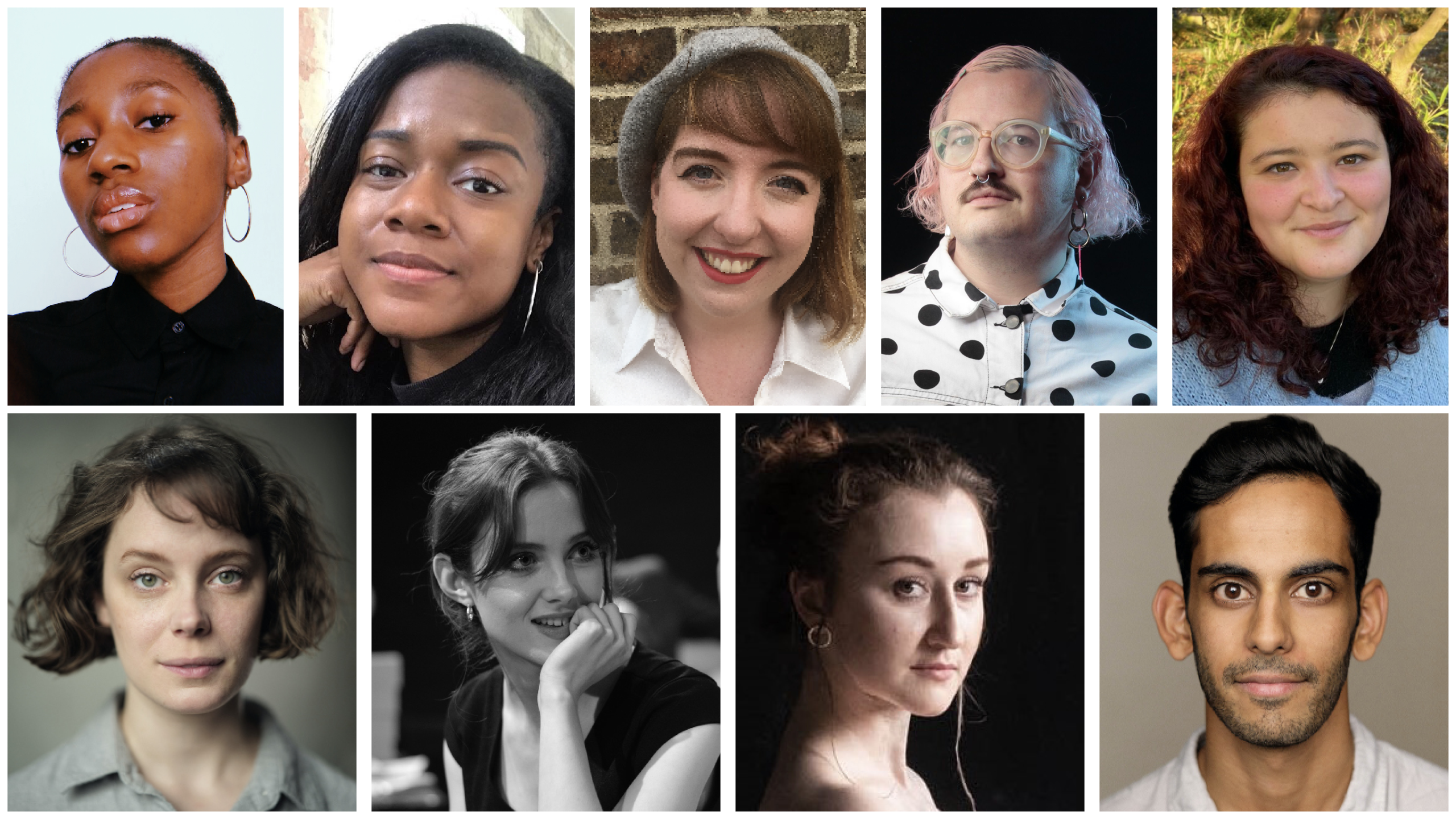

In May 2020 we invited writers across the country to submit their scripts to us, so that we could meet writers we had no previous relationship with and get to know some of them better.
We are now delighted to announce the nine writers who join us as our new associate writers for the next two years: Deborah Acheampong, Natasha Brown, Gillian Greer, Tabby Lamb, Eva Lily, Sarah Middleton, Jessy Roberts, Emilie Robson and Sid Sagar.
Each writer will benefit from:
Middle Child artistic director, Paul Smith, said: “Championing new voices is a key part of what we do, from our writers’ group and scratch night, to our producing of new work, such as Daniel Ward’s George Devine Award-winning The Canary and the Crow.
“This new programme will build meaningful relationships with even more artists and offer genuine support that we are confident will lead to full commissions in the future.
“For a long time we’ve been searching for a better way to get to know writers between first meeting and full commissions and we’re excited that this new programme represents a vital change for how we build lasting collaborations.
“I’m really excited that within our inaugural associate writers we have a really diverse and exciting range of artists, from a variety of backgrounds and experience levels, who will form a key part of our work for years to come.
“The ongoing success of Daniel Ward’s brilliant first play, The Canary and the Crow, proves the importance of companies like ours for supporting new ideas and we can’t wait to get started creating the future with this incredible group of writers.”
“I’m totally looking forward to working as an associate writer for Middle Child, a company that’s edgy, bold and urgent. I love that! As a playwright, I’ve got a thing for stories that are deeply personal; angry, sad, happy, anxious, whatever it may be. Basically, things that grapple with what it means to be human. And in working with Middle Child, I hope that I’ll gain more confidence in exploring that; that I won’t feel afraid to express myself, to write something great or something terrible, all in the aim of becoming a better playwright.”
Deborah first got into theatre when she watched the most boring play ever. It was about the ups and downs in the life of an average couple, so, at first glance, she thought there couldn’t be anything truly remarkable in it. But after leaving, she realised that she had actually watched something that resonated with her, and with the audience, in a way that she hadn’t seen before. Soon she realised that what is most relatable is the most profound. So, she combined her love of the Big Topics; religion, sociology, feminism and politics, and realised that she could use the lives of average people as an accessible way of discussing those themes.
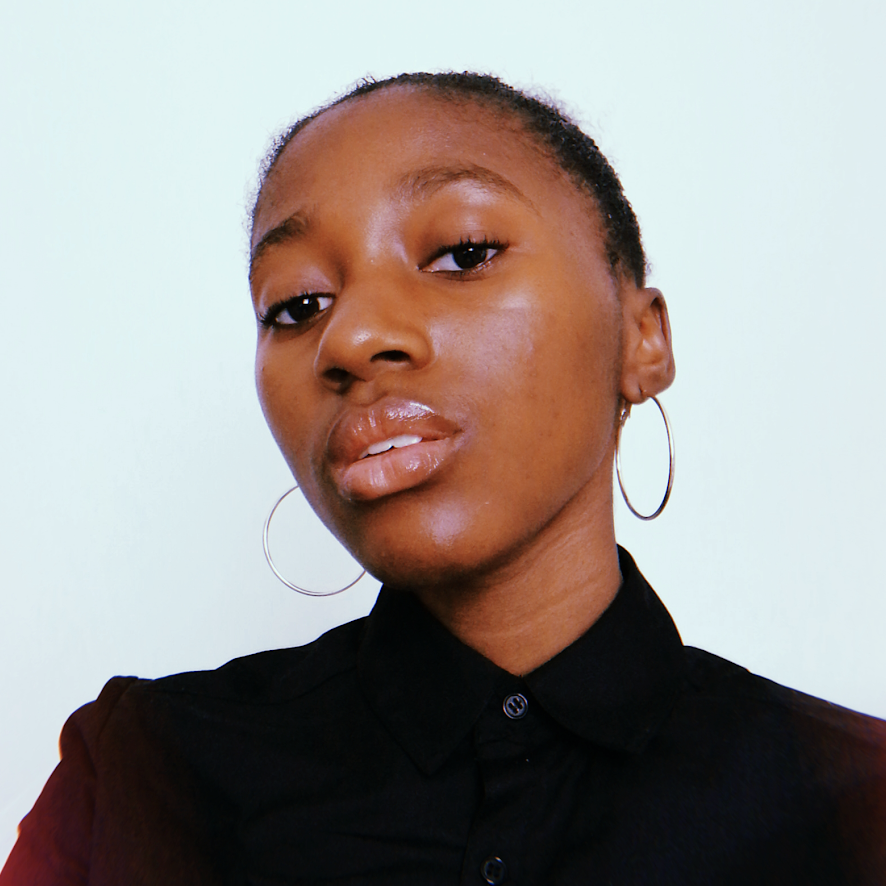
“I’m so excited to be an associated writer at Middle Child theatre. Having the opportunity to develop my practice as a theatremaker with a company that puts accessibility at the forefront of its mission is a privilege. I’m a huge fan of their work and the stories they tell. I can’t wait to skillshare with the other associated writers and to have a space to explore and play with some burning gig theatre ideas. After 2020, I’ve got quite a lot to scream and shout about!”
Natasha Brown is an actor, writer, theatremaker and facilitator based in London. Her work interrogates power, identity and community. She has been part of the Soho Writers’ Lab, the Bush Theatre’s Emerging Writers’ Group and the Soho Accelerate programme. Her debut play I AM [NOT] KANYE WEST received rave reviews when it ran at the Bunker Theatre in March 2020. Her previous work also includes TORCH (Boundless Theatre) and Contradictions (Bush Theatre). As a facilitator, she has created workshops for schools, community groups, artists and young people, most recently working with the Yard Theatre, Theatre Royal Stratford East, the Donmar Warehouse and Clean Break.
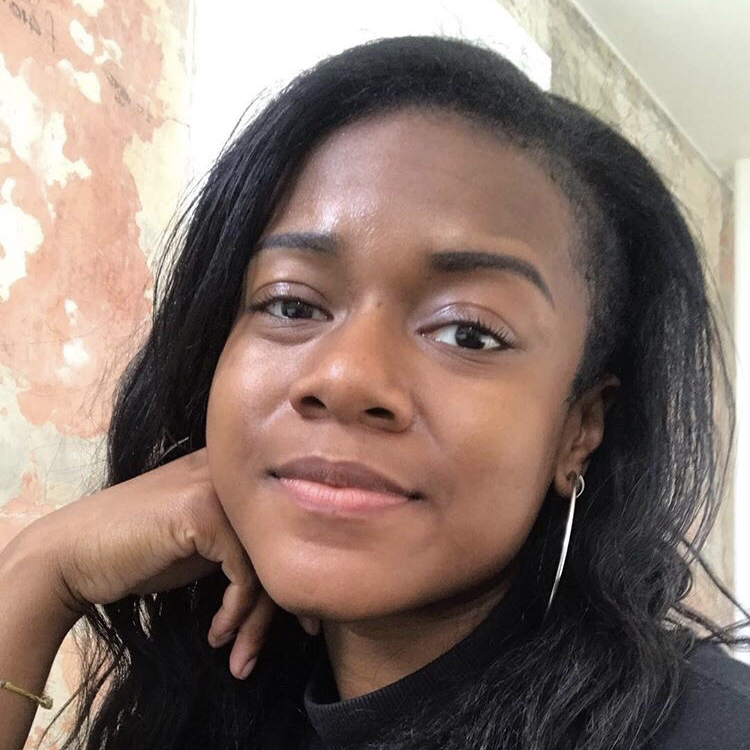
“It’s incredibly exciting to be joining the Middle Child family as an associate writer. I have such admiration for the company, their work and their spirit and I’m looking forward to being inspired by them and exploring how to integrate live music into my style and storytelling in particular.”
Gillian is a playwright and dramaturg from Dublin who has seen her work performed in the Abbey in Dublin, the Traverse in Edinburgh and all manner of London fringe venues. Her debut play Petals was nominated for the Irish Times Theatre Award for Best New Play in 2015, and a radio adaptation won the Celtic Media Award for Radio Drama in 2020. Her second play Meat ran at Theatre503 to critical acclaim in early 2020, just before the world ended. As a dramaturg, she has worked at the National Theatre, VAULT Festival, Clean Break Theatre Company, the Mercury Theatre and many more. She is currently the literary manager of the Soho Theatre.
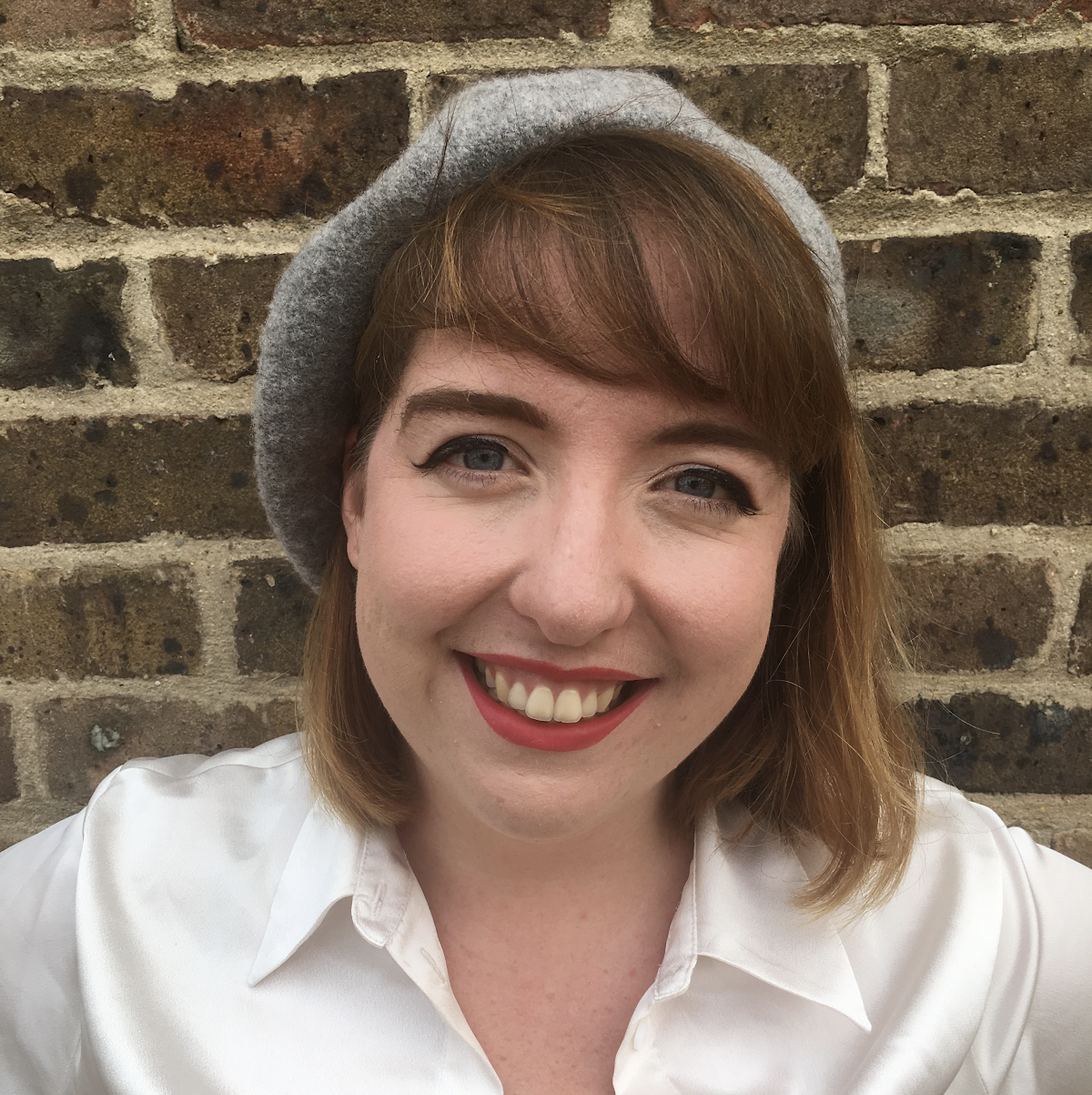
“I am so excited to be part of the Middle Child family, as their shows are always exactly what I look for in theatre: fun, loud and politically sound. I’m looking forward to learning more about how they collaborate interdisciplinarily, especially when it comes to music. At the start of 2020 I promised myself I wouldn’t make any work that centred queer trauma, and would focus on radical acts of queer joy, so I’m looking forward to working with Middle Child to create some fantastic, complex, but ultimately joyous Trans characters.”
Tabby Lamb is a non-binary writer and performer based in East London and a graduate of Dartington College of Arts. Equally inspired by Carly Rae Jepson and Tennessee Williams, they strive to tell stories that explore the intersections between popular culture and politics. Their debut solo show Since U Been Gone, which Tabby wrote and performed, premiered at the Edinburgh Fringe Festival 2019, after previewing at the Gate Theatre. The show was spectacularly received by audiences and garnered a glowing 4* write up from the Guardian who called the play “bold, honest and swollen with love”. They were part of the Soho Theatre Writers Lab and the LGBTQ Arts Review #RaisingOurVoices scheme for queer and trans writers, and are currently one of Oxford Playhouse’s Playhouse Playmakers. Tabby is also currently under commission at the Unicorn Theatre, The Place, 45North & Pentabus Theatre. Alongside their passion for writing, Tabby is a facilitator and runs creative arts projects for young people from the LGBTQ+ community.
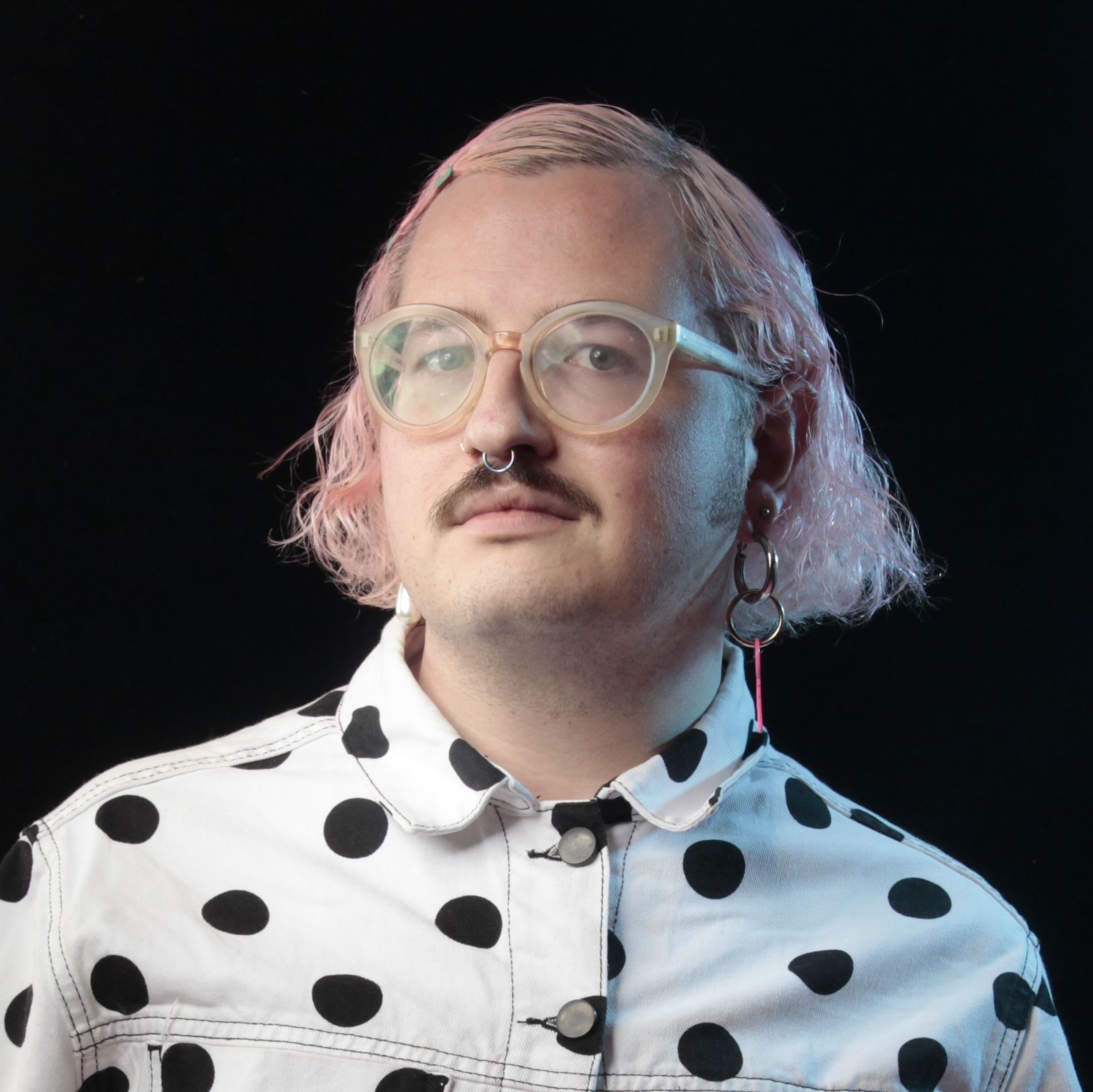
“I am so thrilled and excited to be joining Middle Child’s writing programme. As well as being able to learn from some other fantastic artists and writers, I would like to use this opportunity and space to experiment more within my work and embrace more surreal elements and styles. Recently, I’ve been interested in the concept of ‘story ownership’, particularly in relation to female narratives and so I hope to expand on this further in the work I develop with Middle Child.”
Eva wrote her first play, Bright, while studying English at the University of Exeter. After graduating with a first, she was a member of the Royal Court’s Introduction to Playwriting Course. In 2018, Eva co-founded Eve & Sea Productions and co-wrote their debut show Salmon which has since enjoyed sell out successes and received 4- star reviews. Performances include: Poltimore Festival; Drayton Arms Theatre; Edinburgh Fringe Festival (2019); tour of the South West and a week at Vault Festival in February 2020. Eva’s other previous works include Of Love Letters and Suicide Notes (Exeter Phoenix and Waterloo East Theatre) and The Reply (White Bear Theatre).
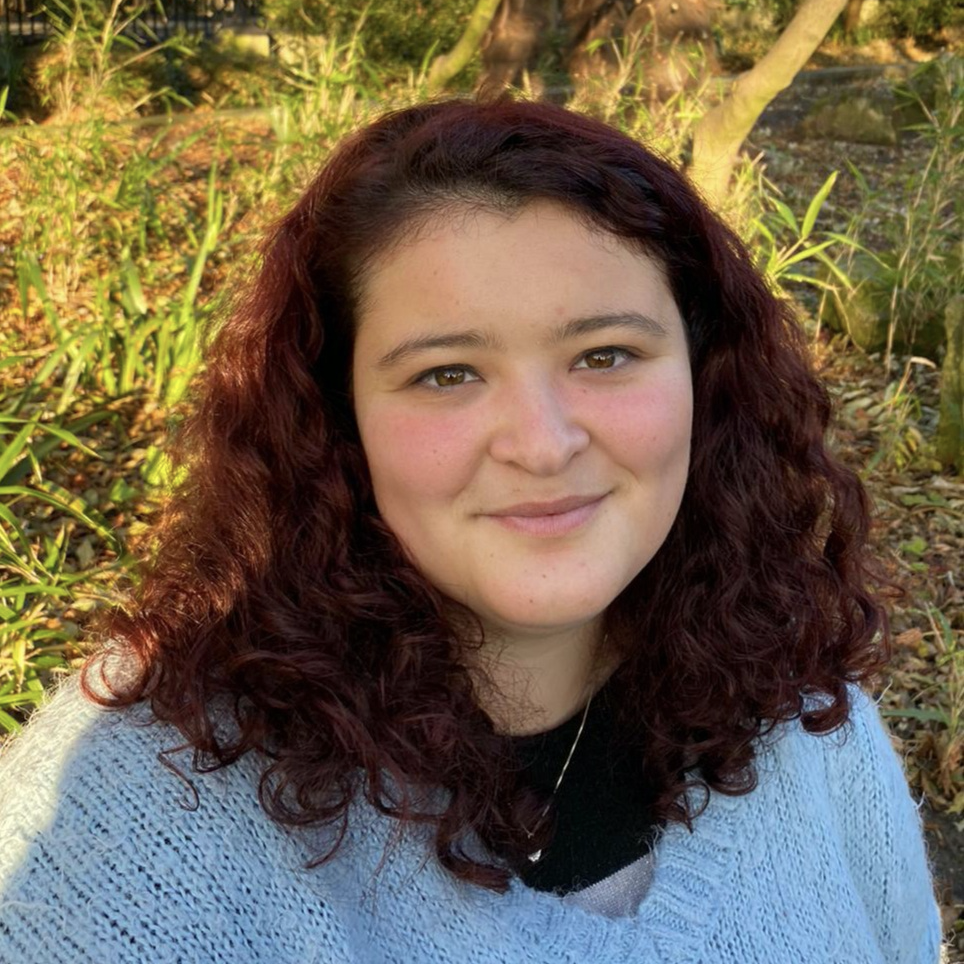
“I’m so happy to be taking part in the programme, and feel really lucky to have been selected. As I’m at the beginning of my journey as a writer, I’m most looking forward to getting stuck into the craft of playwriting. Working alongside a company as dynamic as Middle Child is a dream come true – and I’m hoping to take the opportunity with both hands, whilst exploring female-led narratives about women on missions who talk a bit too much and love snacks. I’m particularly wanting to work on a new idea involving each of these features, plus darts, karaoke and mullets. Can’t wait.”
Sarah Middleton is a theatre-maker and writer originally from Derby. Since 2011 she has worked as an actor, including work at Hull Truck Theatre, Royal Exchange Manchester, Orange Tree and National Theatre. Since 2018 she has been writing alongside acting. Sarah’s writing so far centres around coming-of- age stories and has largely been for and with young audiences. She is particularly interested in writing stories that put women centre-stage, and characters who are adventurous, driven and funny. Sarah’s plays have involved a teenager entering the world hobby-horse championship, a puppet who wants to become a real boy, and two teenagers who take over a barn in the Peak District to stage an enormous climate change protest. In 2019 Sarah was commissioned by Nottingham Playhouse to write an adaptation of Pinocchio for children aged 3-8, which played in the Neville Studio and toured to local schools. Sarah is currently writing and co-producing SHEWOLVES – a new play for young people – along with director Hannah Stone. SHEWOLVES is currently being workshopped with young people in the midlands and will soon go into an R&D, kindly funded by Arts Council England.

“I am over the moon to be working with Middle Child as an associate writer, it’s been such a break in the clouds in 2020. I can’t wait to meet everyone, get to know them and their work, and develop my writing whilst being supported by such a cool company. My work is collage-y and gig theatre-y and angr-y and explores contemporary feminist issues and big questions. I’m excited by the universe and our place within it, and how we can explore that on stage in a theatrical, magical, audience-centric way.”
Jessy is a theatre maker, playwright and director. She studied Theatre: Writing, Directing and Performance at the University of York, and is completing an MA in Directing at Bristol Old Vic Theatre School. She is the Artistic Director of Teastain Theatre, Intern Director for the Rondo Theatre, and a script reader for various organisations. Recent credits as a writer, director and assistant director include: When They Go Low (the egg/Bath Theatre Academy), Messy Eaters (Teastain Theatre/SLAP Festival/York Theatre Royal), Constellations (TakeOver Festival/York Theatre Royal), Wild Thyme and Heather (Teastain Theatre/TakeOver Festival/York Theatre Royal), Lovely Special Best and Most Important (TakeOver Festival/York Theatre Royal), Horseshoes for Hand Grenades (Eric Loren/East Riding Theatre) and One Giant Leap for June (Open Barn Productions).
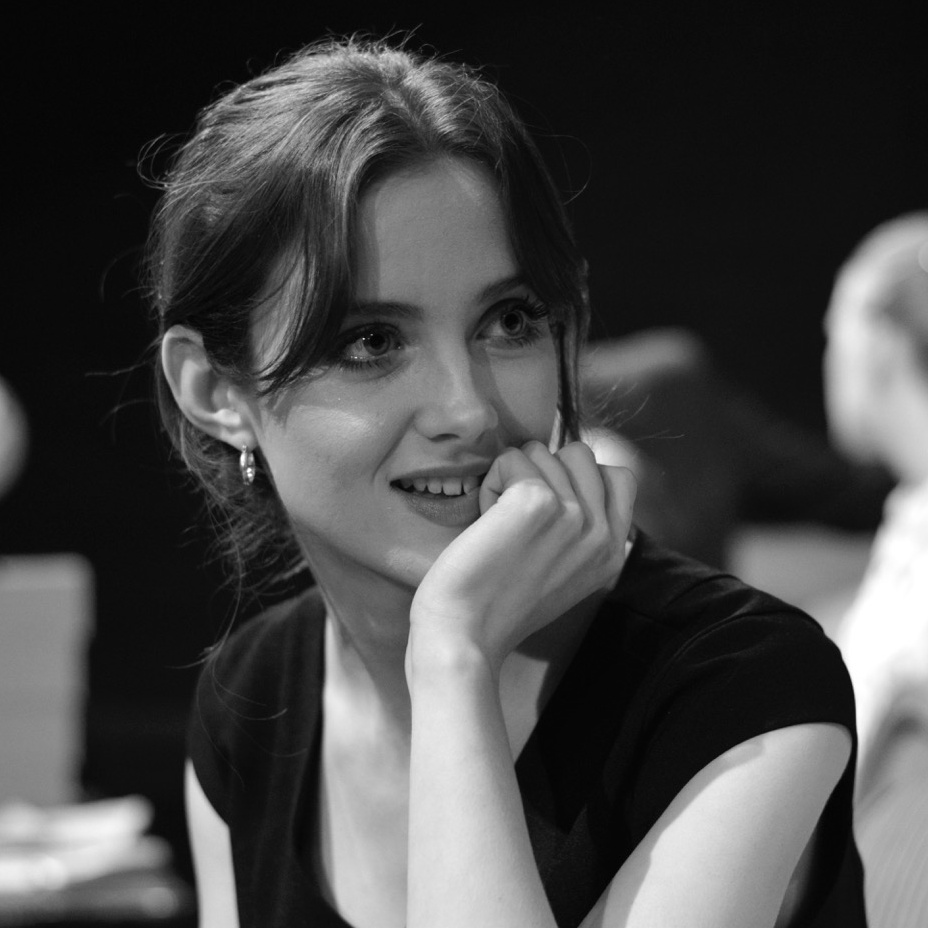
“I am absolutely elated to be invited to join Middle Child as an associate writer. I cannot wait to begin working alongside their accomplished team, developing my voice and style and elevating my practice through this program. My writing typically places women at the centre of the narrative and endeavours to explore ‘little’, everyday stories but hopefully, in a bold and unique way. I hope to write theatre that makes full use of the medium, bends its boundaries and allows the audience to see and hear themselves on stage.”
Originally from South Shields, Emilie Robson has spent the last ten years in Scotland, writing and performing in a mix of both Geordie and Scots. In 2018 she received the Scottish Arts Club’s ‘Bright Spark’ Award for Moonlight on Leith, a Dylan Thomas inspired love letter to Leith, co-written by Laila Noble. The play went on to be named runner up at Theatre Uncut’s Political Playwriting Award ceremony in 2019. She recently received a masters with distinction in Theatre Studies from the University of Glasgow.
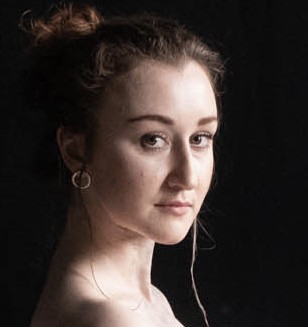
“I’m so excited and grateful to be part of Middle Child’s inaugural associate writers scheme. As an emerging creative in an uncertain time, it means a lot when an organisation actively seeks to develop, enrich and empower new voices. I can’t wait to learn from and contribute to masterclasses, workshops and conversations with the artistic team. I’m passionate about celebrating the comedy, drama and complexity of marginalised voices, and the associated writers scheme is the ideal platform from which to build on my interests and find new ways to make theatre truly accessible and relevant for all.”
Sid is a London-based actor, writer and facilitator. He grew up abroad and has lived in England since the age of eight. He studied at the University of Bristol and trained with the National Youth Theatre, Identity School of Acting and the Writers’ Lab at Soho Theatre. As an actor, he regularly works on stage and screen. As a writer, his short plays have been produced at various venues in London, including Southwark Playhouse, Theatre503 and Rich Mix. His short play, Disruption, was commissioned by Small Truth Theatre for the Kensington Karavan Festival in 2019. His first full length play, Dark Faces in the Night, was shortlisted for the Finborough Theatre’s ETPEP Award and was one of the winners of Rose Theatre Kingston’s inaugural New Writing Festival. He was selected for The Mono Box’s PLAYSTART scheme in 2018 and his short play, Papa, was published by Oberon Books. He’s currently developing an ACE-funded audio drama, a commission for The Mono Box’s Reset the Stage series, a monologue for London Bubble’s Young Theatre Makers Programme, and a co-written sitcom with SLAM Films.

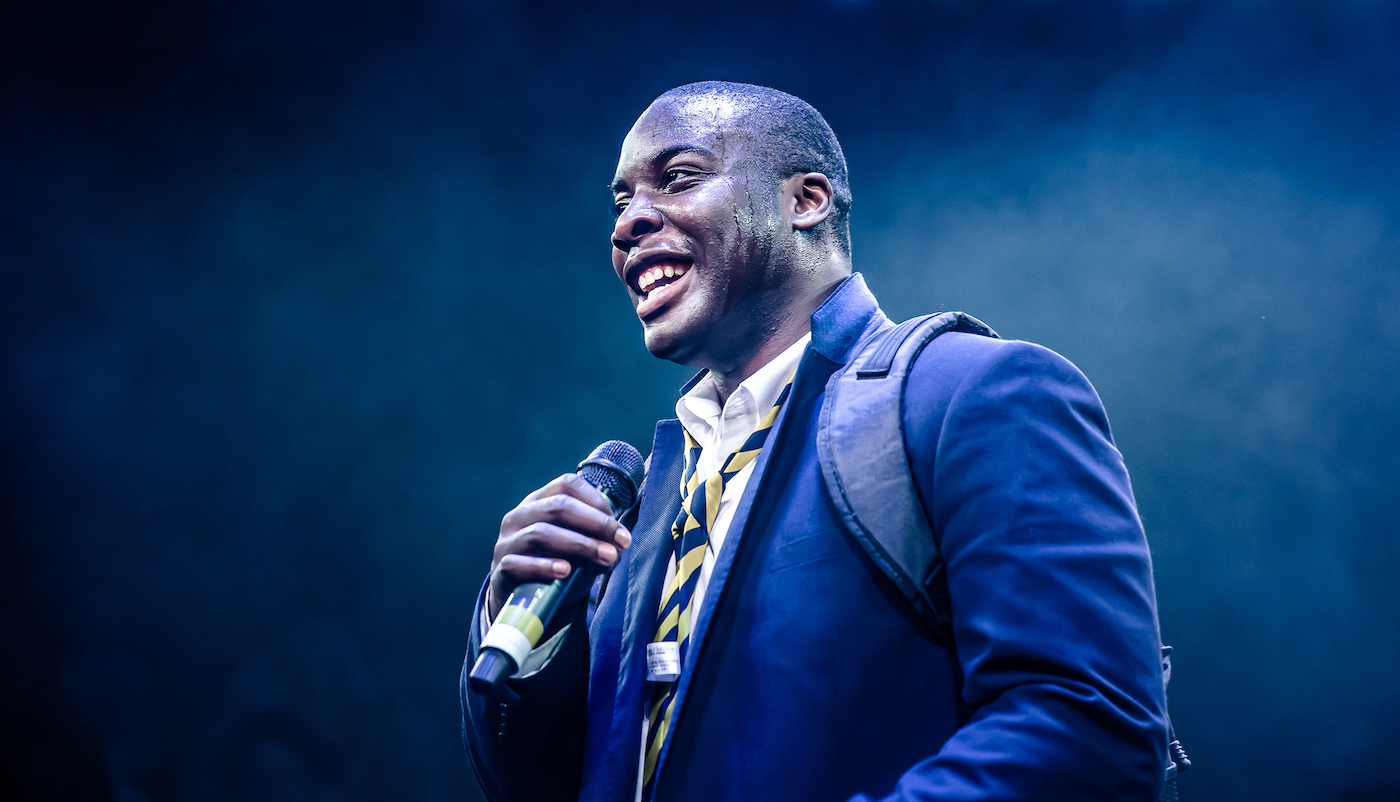

We are absolutely delighted to announce that Daniel Ward has won this year’s George Devine Award for Most Promising Playwright, for his play, The Canary and the Crow.
BBC Radio 4’s Front Row revealed Daniel as the winner on air last night. He also takes home £15,000 in prize money.
It’s been a big year for Daniel, with success at the Writers’ Guild Awards in January, where he won Best Play for Young Audiences with the same play.
Last month he was also shortlisted for the 2020 Alfred Fagon Award, the leading prize for Black British playwrights. The winner will be announced online this Thursday (26 November).
Daniel said: “To sum up what it means to win this award is so, so difficult. I am honoured, delighted, humbled and feel incredibly unworthy to have my name sit alongside the prestigious list of previous George Devine winners.
“I am thankful to everyone that has contributed to the creation of this piece, too numerous to mention, so please excuse me for not going into an expansive list. Please know that I hold everyone in my heart.
“In a year when the arts and theatre has faced such turmoil, I am thankful to the artists who continue to bring such creativity, light and inspiration to the world. I pray that light continues to shine into next year and beyond.
“There are writers who made the shortlist for the George Devine award who have personally inspired me, so thank you.”
The Canary and the Crow is a semi-autobiographical piece of grime-inspired gig theatre that tells the story of a working class black kid accepted to a prestigious grammar school.
Daniel added: “I am a black man. The Canary and the Crow is a story that centres the lived experience of a black man.
“In 2020 what that means has taken on much greater significance. I wrote this play to highlight the often difficult to articulate experiences of black people navigating society.
“When it was staged the response was far more positive than I could have ever imagined, but what was particularly special was the black and brown people who approached me, telling me how much it resonated with them and thanking me for championing their stories.
“Honestly, I felt that was reward enough. The George Devine award is a very welcome, but very unexpected bonus.
“I humbly accept this award not only for myself but also on behalf of those black and brown people who have been often overlooked and undervalued. Simply put, winning this award, in this year, for this story, means everything.”
Originally written in 2014, Daniel developed the script with Middle Child during a week-long residency in 2018.
Middle Child then produced and premiered the show at Hull Truck Theatre in 2019.
It went on to great success at the Edinburgh Fringe Festival, winning a number of awards and rave reviews, before transferring to London’s Arcola Theatre in January 2020.
Middle Child artistic director, Paul Smith, said: “From the first time I read Dan’s play it was clear that this was a story that had to be told. Its subsequent success is testament to Dan’s hard work and ability as a writer.
“His play is a vital and searing dissection of racism and classism, a stunning call to arms which demands change. We’re honoured to be associated with such a brilliant piece of work and can’t wait to see what Dan goes on to do next.”
Previous winners of the George Devine Award include Richard Bean, Mike Leigh, Laura Wade, Lucy Prebble and Middle Child associate artist, Tom Wells.
Above: Daniel Ward in The Canary and the Crow. Photo by The Other Richard.